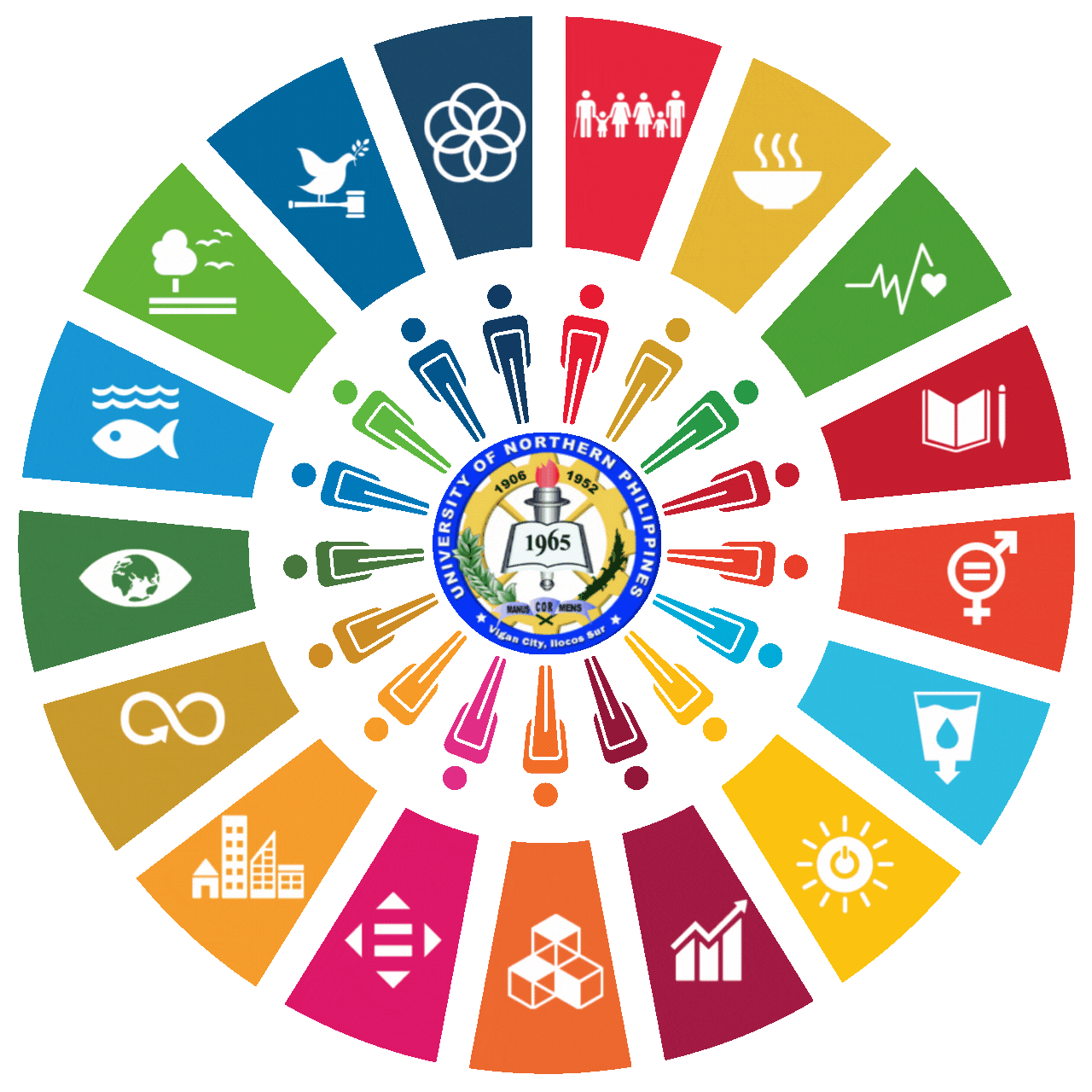

SDG 6 - CLEAN WATER AND SANITATION
Water, a fundamental necessity for human survival and societal well-being, is at the heart of Sustainable Development Goal 6 (SDG 6). Ensuring the availability and sustainable management of water and sanitation for all is a global priority. Educational institutions play a crucial role in achieving this goal by fostering awareness, promoting sustainable practices, and empowering future generations to become responsible stewards of water resources.
The University of Northern Philippines (UNP) has demonstrated a strong commitment to SDG 6 through various initiatives and programs across different colleges. These initiatives highlight the university’s dedication to addressing water and sanitation challenges and promoting community engagement in creating a more sustainable future.
Project Danggay: A Donation Drive for the Victims of Super Typhoon Egay
In response to the urgent need for clean water and sanitation supplies following Super Typhoon Egay, the students of the College of Business Administration and Accountancy (OBAS) organized a donation drive. This initiative reflects their commitment to social responsibility and their understanding of the importance of clean water and sanitation in disaster relief efforts.

The OBAS students demonstrate a strong commitment to social responsibility by actively participating in the “Project Danggay” donation drive, contributing to SDG 6: Clean Water and Sanitation. Recognizing the urgent need for clean water and sanitation supplies in the aftermath of Super Typhoon Egay, they pooled their resources to purchase essential goods for the affected communities. This proactive involvement showcases their dedication to community service and highlights the important role students can play in disaster relief efforts. By contributing in their own way, the OBAS students embody the spirit of “bayanihan,” extending a helping hand to those in need and working together towards a common goal. This initiative not only provides much-needed aid but also fosters a sense of civic duty and compassion among the students.
Salwad Aglawlaw Program
The College of Public Administration, in partnership with the Local Government Unit of Sinait, conducted a coastal clean-up drive at Lugo Beach, Dadalaquiten Norte. This initiative aimed to improve water quality in the local environment and protect marine ecosystems. The college also organized an “eco-lecture” series to raise awareness about environmental governance, sustainable practices, and the interconnectedness of human actions with the health of the planet.

This initiative aligns with SDG 6: Clean Water and Sanitation, specifically Target 6.3: Improve water quality and wastewater treatment. By conducting a coastal clean-up drive at Lugo Beach, the College of Public Administration and the community of Brgy. Dadalaquiten Norte are directly taking action to improve water quality in their local environment. Removing waste and debris from the coast helps prevent pollution from entering the water, protecting marine ecosystems and ensuring a healthier environment for both people and wildlife. This collaborative effort demonstrates a commitment to environmental stewardship and the importance of community involvement in achieving sustainable development goals. The eco-lecture series further reinforces this commitment by raising awareness about environmental governance, sustainable practices, and the interconnectedness of human actions with the health of our planet.
KAPIT BISIG INITIATIVE: Distribution of Prophylaxis for Leptospirosis
The College of Medicine, in collaboration with student organizations, physicians, and medical societies, provided prophylaxis for leptospirosis to medical students following a typhoon. This initiative focused on preventing waterborne diseases and protecting vulnerable groups after a natural disaster.

The “Kapit Bisig” initiative demonstrates a strong commitment to community health by providing prophylaxis for leptospirosis to medical students following a typhoon. This proactive measure protects a vulnerable group from a waterborne disease that often spreads after such disasters. The collaborative effort between student organizations, physicians, and medical societies highlights the importance of partnerships in strengthening health responses and building local capacity to address water-related health risks. Although not explicitly focused on water and sanitation infrastructure, the initiative’s emphasis on disease prevention and community health aligns with SDG 6, particularly Target 6.a, which promotes international cooperation and capacity building for water and sanitation-related activities.View full article here>>
Child Health and Maternal Project (CHAMP)
The CHAMP project focused on improving maternal and child health by providing comprehensive care to indigent multigravida mothers and their babies. This included prenatal check-ups, safe delivery services, family planning, and early childhood development support.
The CHAMP project focuses on improving maternal and child health by providing comprehensive care to indigent multigravida mothers and their babies. This includes prenatal check-ups, safe delivery services, family planning, and early childhood development support. By addressing the health needs of this vulnerable group, the project indirectly contributes to SDG 6, particularly Target 6.2, which aims to achieve access to adequate sanitation and hygiene for all. CHAMP’s holistic approach recognizes the interconnectedness of health, education, and socioeconomic factors in achieving sustainable development goals related to water and sanitation.

UNP Produces New Batch of Sanitary Engineers
The College of Engineering celebrated the graduation of newly-minted sanitary engineers, highlighting the university’s contribution to building a skilled workforce capable of addressing water and sanitation challenges.
The new sanitary engineers from UNP College of Engineering strengthens the Philippines’ capacity to address water and sanitation challenges. These skilled professionals are crucial for designing and implementing sustainable solutions for clean water, wastewater treatment, and sanitation systems. This achievement aligns with SDG 6, particularly Target 6.a, which emphasizes capacity building in developing countries for water and sanitation-related activities. By investing in the education of these engineers, UNP contributes to improved public health and sustainable development in the Philippines.

These initiatives demonstrate UNP’s commitment to SDG 6 and its understanding of the interconnectedness of water, sanitation, health, and sustainable development. By engaging students, faculty, and the community in these efforts, UNP is contributing to a future where clean water and sanitation are accessible to all.


















